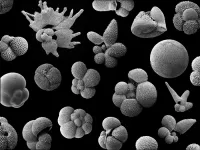(Press-News.org) When we think of evolution, we think of a process that happens over hundreds or thousands of years. In research recently published, a team led by Rick Relyea, Ph.D., professor of biological sciences and David M. Darrin ’40 Senior Endowed Chair at Rensselaer Polytechnic Institute, found a species of frog that has evolved over the course of merely 25 years. The adaptation was spurred on by something many assume is innocuous: salt.
“We’ve been applying de-icing salts to reduce car accidents in snowy and icy conditions in the United States for 80 years, and we currently apply four times more road salt than we did in the 1970s,” said Relyea. “However, the number of studies on its impacts to our environment are relatively few. We’re beginning to learn that when salt drains into fresh water, it can kill animals, stunt the growth of fish, cause sex changes in frogs, and make animals more prone to diseases.”
“Amphibians like to breed in wetlands, which have smaller water volumes than lakes, so the salt concentrations in wetlands can accumulate to very high levels,” said Relyea. “In our study, the highest salt concentration was found in a wetland adjacent to a parking lot that’s been there for 25 years, where the salt concentrations are nearly 100 times higher than in pristine wetlands. We found that over the course of just 10 generations, these wood frogs evolved a much higher salt tolerance.”
The research team collected frog eggs from nine populations and allowed them to hatch into tadpoles. Then the team examined whether populations of tadpoles from more salt-polluted waters had evolved higher salt tolerance. Tadpoles collected from the saltiest wetland experienced a notably longer time until death when exposed to salt than the eight other populations collected from other areas close to roads and with varying levels of salt, suggesting an evolved tolerance. However, the frogs’ ability to adapt does not mean that we should expect them to survive if salt levels increase even more.
Relyea hopes that insights gained from this study will help protect many species of plants and animals that are being exposed to salt pollution.
“The fact that these amphibians rapidly evolved to deal with high salt levels suggests that we have time to avoid extinction, in this species and probably many other species,” said Relyea. “Fortunately, cities and towns around the country are learning how they can apply less salt with the same level of safety, by applying it in smarter ways. Everyone across the political spectrum can agree to this win-win proposition: we can apply less salt and protect the environment, while maintaining safe roads and saving money for governments and taxpayers.”
“The effects of human activity on our environment must be understood and mitigated,” said Curt Breneman, Ph.D., dean of Rensselaer’s School of Science. “Thanks to Professor Relyea’s research, we have evidence of the effect of road salt on one species. Fortunately, while these results show that certain amphibians can adapt quickly to some environmental toxins, they also provide a warning that scientific and policy solutions must be found to mitigate such pollution.”
Relyea was joined in research by Brian Mattes, Candace Schermerhorn, and Isaac Shepard of Rensselaer.
###
About Rensselaer Polytechnic Institute:
Founded in 1824 for the application of science to the common purposes of life, Rensselaer Polytechnic Institute is the first technological research university in the United States. Today, it is recognized as a premier university, noted for its robust and holistic learning community that connects creativity with science and technology. RPI is dedicated to inventing for the future, from shaping the scientists, engineers, technologists, architects, and entrepreneurs who will define what’s next for humanity, to research that bridges disciplines to solve the world's toughest problems. Learn more at rpi.edu.
Contact:
Katie Malatino
Senior Communications Specialist
malatk@rpi.edu
838-240-5691
For general inquiries: newsmedia@rpi.edu
Visit the Rensselaer research and discovery blog: https://everydaymatters.rpi.edu/
Follow us on Twitter: @RPINews
END
A new publication from Opto-Electronic Advances; DOI 10.29026/oea.2024.230184 , discusses tailoring electron vortex beams with customizable intensity patterns by electron diffraction holography.
In recent years, the scientific community has witnessed a notable breakthrough in the study and development of electron vortices. Electron vortices are electron beams that carry orbital angular momentum, meaning the electrons move not only in their propagation direction but also rotate in a vortex-like manner. This unique characteristic offers many new physical properties and potential applications, making it a powerful ...
sychologists from Simon Fraser University (SFU) and the University of Sussex have found that people are as hesitant to reach out to an old friend as they are to strike up a conversation with a stranger, even when they had the capacity and desire to do so. The new research is published today in the journal Nature Communications Psychology.
Scientific research has shown that social relationships are important to human happiness, and that the greater the number and range of friendships that we engage with, the better our wellbeing. But once relationships are formed, some ...
Even with important strides in addressing health issues across the globe, men have not benefited equally compared to women. Men’s life expectancies have not grown as steadily as women’s over the past few decades, and they are expected to live about five years less than women, according to 2021 global health data from the Human Mortality Database and the United Nations’ World Population Prospects. The discrepancy in life expectancy between men and women persists in places all over the world, and is even growing in other places.
At a time when health resources are at a premium and need to be wisely allocated, health professionals ...
https://www.scienceopen.com/hosted-document?doi=10.15212/CVIA.2024.0024
Announcing a new article publication for Cardiovascular Innovations and Applications journal. This study was aimed at comparing the “late catch-up” phenomenon between the BuMA Supreme bioresorbable polymer sirolimus-eluting stent and the XIENCE stent through serial optical coherence tomography (OCT) at within 2 months and 2 year follow-ups.
A total of 49 of 75 patients from the PIONEER-II study were enrolled in a 2 year OCT follow-up study; 44 patients with 50 lesions were included in the statistical ...
For hundreds of millions of years, the oceans have teemed with single-celled organisms called foraminifera, hard-shelled, microscopic creatures at the bottom of the food chain. The fossil record of these primordial specks offers clues into future changes in global biodiversity, related to our warming climate.
Using a high-resolution global dataset of planktonic foraminifera fossils that’s among the richest biological archives available to science, researchers have found that major environmental stress events leading to mass extinctions are reliably preceded by subtle changes in how a biological ...
In a new study in Issues, Dominique J. Baker, an associate professor in the College of Education and Human Development and the Joseph R. Biden, Jr. School of Public Policy & Administration at the University of Delaware, explored the role of student loans on hopeful students striving for college degrees, particularly in STEM.
The cost of attending a public four-year college in the United States has more than doubled since the early 1990s, when inflation is factored in.
Undergraduate student loan debt has become unmanageable for a wide swath of borrowers ...
As computer programming becomes an increasingly valued skill in the workforce, there is a greater need to understand how people learn to code most effectively.
Statistics show that up to 50% of students who enroll in introductory programming courses in the United States eventually drop out, suggesting a mismatch between how coding is learned and the way it’s taught. A new study from the University of Washington, published March 5 in Scientific Reports, examines that issue.
The researchers recorded electrophysiological brain responses of varyingly skilled programmers as they read ...
Physicist Denis T. Keane is the 2024 recipient of the Gopal K. Shenoy Excellence in Beamline Science Award. He is a beamline scientist and director of the Dupont-Northwestern-Dow Collaborative Access Team (DND-CAT) at the U.S. Department of Energy’s (DOE) Advanced Photon Source (APS) at DOE’s Argonne National Laboratory. He is also a research professor in the Materials Science and Engineering Department at Northwestern University.
The annual award recognizes active beamline scientists at the APS, ...
A small-scale surveillance system in Tanzania for reporting livestock abortions could help protect livelihoods and provide insights on potential livestock-to-human infections.
The research, published April 16 as a Reviewed Preprint in eLife, is described by editors as an important study with convincing findings of potential interest to the fields of veterinary medicine, public health and epidemiology.
Loss of livestock through abortion is a major concern for the worldwide livestock industry, resulting in significant ...
Researchers have described the optimal timing for COVID-19 patients to take the antiviral, Paxlovid, to get the most benefit from the treatment, according to a study published April 16 in eLife.
The findings suggest that taking Paxlovid three to five days after COVID-19 symptoms emerge may maximise the drug’s ability to reduce viral loads, minimise viral spread and reduce viral rebound. They also indicate that broader use of Paxlovid during this window might be a powerful tool to help curb the spread of the SARS-CoV-2 ...





